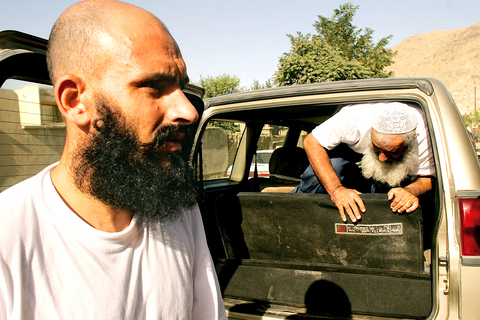Two Afghans released from Guantanamo Bay have claimed that about 180 Afghans at the US detention facility were on a hunger strike to protest alleged mistreatment and to push for freedom.
Habir Russol and Moheb Ullah Borekzai, who said they left the prison camp on Cuba on Monday and were flown to Afghanistan before being freed, said on Wednesday that they did not participate in the hunger strike. They did not say how they knew others were refusing to eat.
A Pentagon spokesman, Navy Lieutenant Commander Flex Plexico, said he was unaware of a hunger strike at Guantanamo Bay but would inquire.

PHOTO: AP
Amnesty International in London said it knew nothing about hunger strikes at Guantanamo, other than media reports.
Russol said 180 Afghan prisoners "are not eating or drinking." He and Borekzai estimated the men were in the 14th or 15th day of their fast. Borekzai later said that the detainees were protesting because "some of these people say they were mistreated during interrogation. Some say they are innocent."
"They are protesting that they have been in jail nearly four years and they want to be released," he said.
Neil Koslowe, a Washington-based lawyer for 12 detainees from Kuwait, said several inmates told him during a June 20-24 visit to Guantanamo that there was a "widespread" hunger strike over the amount and quality of their drinking water.
The two Afghans released this week said they had been accused of being members of the former Taliban regime, but both said they were innocent. Neither said how long they had been detained.
The Pentagon announced, meanwhile, that seven Guantanamo detainees had been released and an eighth transferred to the custody a foreign government. In addition to the two released Afghans, three Saudi Arabians, a Jordanian and a Sudanese were freed, the Pentagon said.
The three Saudis, who were not identified, were handed over to Saudi security, the official Saudi Press Agency said in Riyadh. It did not specify whether the three were detained for questioning, saying only that "the regular procedures will be applied accordingly."
In addition, a Moroccan was transferred to control of the government of Spain, US officials said. The Pentagon did not identify the detainees. The Moroccan was identified earlier this week in Spain as Lahcen Ikassrien, who had been charged there for his links to an al-Qaeda cell.
The US defense department has sought to dispute allegations of mistreatment of detainees at the Guantanamo camp, where about 520 prisoners remain, mostly Afghans, Pakistanis, as well as others captured after the US invasion of Afghanistan in 2001.

Indonesia yesterday began enforcing its newly ratified penal code, replacing a Dutch-era criminal law that had governed the country for more than 80 years and marking a major shift in its legal landscape. Since proclaiming independence in 1945, the Southeast Asian country had continued to operate under a colonial framework widely criticized as outdated and misaligned with Indonesia’s social values. Efforts to revise the code stalled for decades as lawmakers debated how to balance human rights, religious norms and local traditions in the world’s most populous Muslim-majority nation. The 345-page Indonesian Penal Code, known as the KUHP, was passed in 2022. It

‘DISRESPECTFUL’: Katie Miller, the wife of Trump’s most influential adviser, drew ire by posting an image of Greenland in the colors of the US flag, captioning it ‘SOON’ US President Donald Trump on Sunday doubled down on his claim that Greenland should become part of the US, despite calls by the Danish prime minister to stop “threatening” the territory. Washington’s military intervention in Venezuela has reignited fears for Greenland, which Trump has repeatedly said he wants to annex, given its strategic location in the arctic. While aboard Air Force One en route to Washington, Trump reiterated the goal. “We need Greenland from the standpoint of national security, and Denmark is not going to be able to do it,” he said in response to a reporter’s question. “We’ll worry about Greenland in

PERILOUS JOURNEY: Over just a matter of days last month, about 1,600 Afghans who were at risk of perishing due to the cold weather were rescued in the mountains Habibullah set off from his home in western Afghanistan determined to find work in Iran, only for the 15-year-old to freeze to death while walking across the mountainous frontier. “He was forced to go, to bring food for the family,” his mother, Mah Jan, said at her mud home in Ghunjan village. “We have no food to eat, we have no clothes to wear. The house in which I live has no electricity, no water. I have no proper window, nothing to burn for heating,” she added, clutching a photograph of her son. Habibullah was one of at least 18 migrants who died

Russia early yesterday bombarded Ukraine, killing two people in the Kyiv region, authorities said on the eve of a diplomatic summit in France. A nationwide siren was issued just after midnight, while Ukraine’s military said air defenses were operating in several places. In the capital, a private medical facility caught fire as a result of the Russian strikes, killing one person and wounding three others, the State Emergency Service of Kyiv said. It released images of rescuers removing people on stretchers from a gutted building. Another pre-dawn attack on the neighboring city of Fastiv killed one man in his 70s, Kyiv Governor Mykola